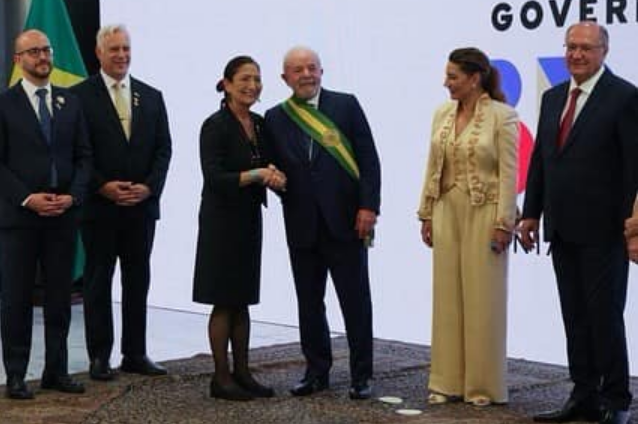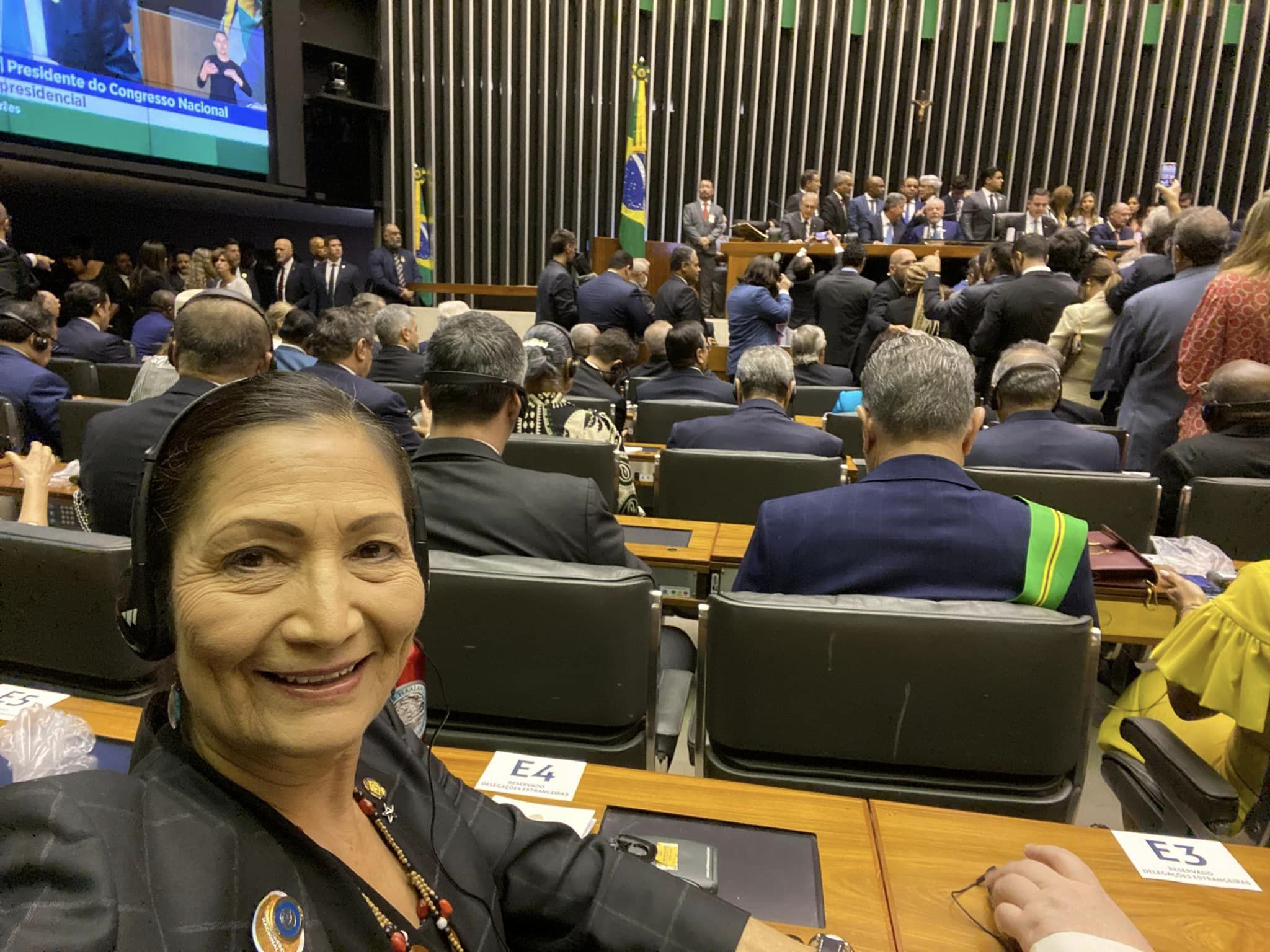
- Details
- By Native News Online Staff
The first Native American to serve in a secretarial position within a presidential cabinet, U.S. Secretary of the Interior Deb Haaland (Laguna Pueblo)on Sunday, January 1, 2023, led the Presidential Delegation of the United States on behalf of President Joe Biden to the presidential Inauguration of His Excellency Luiz Inácio Lula da Silva.
“I was honored to represent President Biden, our administration, and the American people at President Lula's inauguration and to celebrate the longstanding and important partnership between the United States and Brazil,” Secretary Haaland said. “Our shared commitment to democracy, human rights, Indigenous peoples, equitable economic growth, environmental protection, and other core values makes us natural partners. The Biden-Harris administration intends to use every opportunity to broaden and deepen that partnership with President Lula's government in the years to come.”
This will be Lula's third term, after previously governing Brazil for two consecutive terms between 2003 and 2010.
“Our message to Brazil is one of hope and reconstruction,” Lula said in a speech in Congress’ Lower House after signing the document that formally instates him as president. “The great edifice of rights, sovereignty and development that this nation built has been systematically demolished in recent years. To re-erect this edifice, we are going to direct all our efforts.”
 Make A Donation Here
Make A Donation Here
Secretary Haaland was joined by Special Assistant to the President and Senior Director for Western Hemisphere Affairs at the National Security Council Juan Gonzalez, and Chargé d’Affaires of the U.S. Embassy and Consulates in Brazil Douglas A. Koneff. Secretary Haaland and the delegation participated in all the major inaugural events and held other meetings with counterparts and partners.

The Department of the Interior has a long history of collaboration with Brazilian counterparts on a wide range of environmental and natural resources issues. The U.S. Geological Survey and Bureau of Reclamation engage in technical exchanges with the National Water Agency, on topics such as hydrologic surveys and dam safety. The U.S. Fish and Wildlife Service and National Park Service partner with the Environment and Sustainable Natural Resources Ministry on conservation and protected area management. And the Bureau of Safety and Environmental Enforcement and Bureau of Ocean Energy Management are in dialogue with counterparts in Brazil about offshore wind development and carbon sequestration. Most recently, in November the Department and the U.S. Agency for International Development (USAID) facilitated a knowledge exchange between officials from six U.S. Tribes and representatives of Indigenous communities in the Amazon.
“My Department looks forward to continuing these important partnerships with our Brazilian colleagues,” added Secretary Haaland.
In addition to attending the inauguration, Secretary Haaland met with Joênia Wapichana (incoming President of the National Indigenous Foundation), Toya Manchineri (Coordinator of the Coordination of Indigenous Organizations of the Brazilian Amazon), and other Indigenous leaders and partner institutions implementing U.S.-funded environmental programs in Brazil. In those meetings, the delegation discussed the priorities and challenges of Indigenous peoples in Brazil, opportunities to deepen collaboration between U.S. and Brazilian Indigenous communities, and partnership with the USAID to engage communities whose lives depend on the integrity and conservation of the Brazilian Amazon ecosystem.
More Stories Like This
Native News Weekly (August 25, 2024): D.C. BriefsUS Presidents in Their Own Words Concerning American Indians
Monday Morning (December 8, 2025): Articles You May Have Missed This Past Weekend
Native News Weekly (December 7, 2025): D.C. Briefs
Breaking: Final Defense Legislation Grants Federal Recognition to Lumbee Tribe
Help us defend tribal sovereignty.
At Native News Online, our mission is rooted in telling the stories that strengthen sovereignty and uplift Indigenous voices — not just at year’s end, but every single day.
Because of your generosity last year, we were able to keep our reporters on the ground in tribal communities, at national gatherings and in the halls of Congress — covering the issues that matter most to Indian Country: sovereignty, culture, education, health and economic opportunity.
That support sustained us through a tough year in 2025. Now, as we look to the year ahead, we need your help right now to ensure warrior journalism remains strong — reporting that defends tribal sovereignty, amplifies Native truth, and holds power accountable.
 The stakes couldn't be higher. Your support keeps Native voices heard, Native stories told and Native sovereignty defended.
The stakes couldn't be higher. Your support keeps Native voices heard, Native stories told and Native sovereignty defended.
Stand with Warrior Journalism today.
Levi Rickert (Potawatomi), Editor & Publisher

